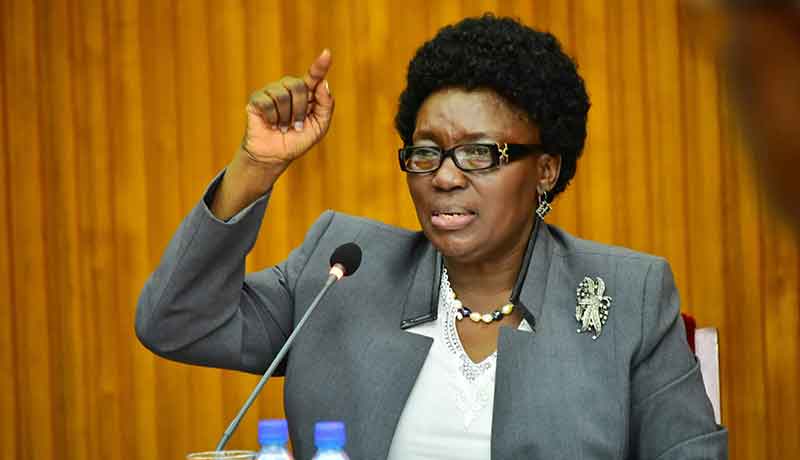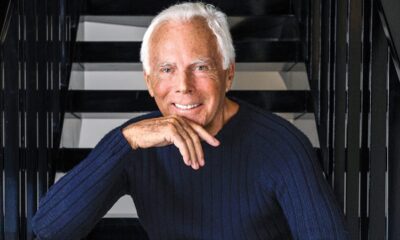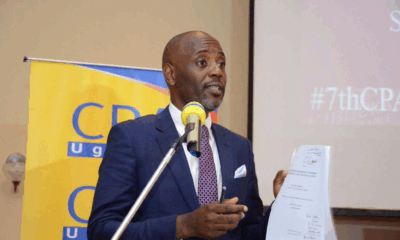News
‘Gov’t has failed Ugandans on Regional Trade’
EALA MP Mbidde slams government for refusing to solve problems it was entrusted to handle

East African Legislative Assembly Member Fred Mukasa Mbidde
Relations between Uganda and her biggest trading partner Kenya this week took a dramatic turn for the worse when the government decided it will impose a retaliatory trade ban against her eastern neighbor following Kenya’s decision to continue to impose non-tariff barriers and block a number of Uganda’s agricultural products including poultry and dairy products to access her market.
The First Deputy Prime Minister and Minister for East African Community Affairs and Speaker Emeritus Rebecca Kadaga told a news conference on Tuesday that Uganda’s Cabinet had decided to retaliate against Kenya, by reciprocating bans on some of their agricultural exports to Uganda.
The decision came after Ugandan Poultry farmers petitioned the trade ministry to intervene and stop financial hemorrhage arising from blocked exports to Kenya, a move that goes against the tariff and quota free trade agreements that the two countries agreed upon under the East African Customs Union.
Recently Kenya’s Directorate of Trade imposed a ban on the export of eggs from Uganda over after Kenyan farmers complained they were being outcompeted from the market by Uganda’s cheaper eggs.
Andrew Rubayihayo, a member of the Uganda Poultry Farmers Association of Uganda, narrated to listeners of KFM’s HotSeat talk show program on Tuesday that poultry farmers can no longer bare the losses and have started to sell the birds for meat (as off layers).
The latest ban is not an isolated incident considering that Kenyans have previously banned exports of maize, sugar, chicken and meat allegedly on safety grounds or at the instigation of farmers. Kadaga said the retaliatory measures are meant to send a strong signal that Uganda will no longer be patronized.
But one of Uganda’s long-serving representatives to the East African Legislative Assembly Fred Mukasa Mbidde argues that the government is using the wrong methods to settle the dispute with Kenya.
Mbidde argues that the government has failed to make use of numerous dispute resolution mechanisms, and is now trying to play to the gallery.
The East African Community (EAC) establishes numerous mechanisms for trade dispute resolution. First of all, there is a Council of Ministers of East Africa. This Council can convene if it’s not a bilateral matter, and find a solution to it.
Secondly, the Presidents of both countries meet regularly. What do they talk about? Recently President Uhuru spent four days with President Museveni. Unless you want to tell me that these leaders are just hood winking the masses, what were they talking about if they didn’t talk about resolving trade disputes, because this is what concerns the people?”
Mbidde has blamed the failure to use existing mechanisms for dispute resolution squarely on the shoulders of the technocrats in the relevant ministries such as the Ministries of Finance, Trade, EAC and the Attorney General’s office.
He says: “The Council of Ministers regularly meets ahead of the Summit of Heads of States. What are they preparing the Presidents to talk about? Instead, you hear they are preparing presidents to discuss reducing the number of EALA MPs – thinking that this is the method for reducing the expenditure of the EAC!
Mbidde argues that the governments have obstructed measures that would have helped to resolve trade disputes.
“The Presidents took a decision very long ago and set the date of 15-Aug-2015 as the deadline for all partner states to accede to a document accepting the jurisdiction of the East African Court of Justice to cover trade-related matters. Up to today Attorneys Generals have not sat to accede to that document.” “So for me these people should just go. They are simply tired! Now they think the court of public opinion will resolve the trade dispute?” Mbidde wondered.
Mbidde expressed frustration at the fact that the government that was entrusted with power and authority to resolve matters, is instead escalating them.
“The dispute between Uganda and Kenya, to me is lackadaisical. This time I don’t want to blame presidents but rather the technocrats in the ministries.
“I have wasted my ten years in EALA thinking that these people were laying the basis for cooperation, Kumbe [yet] they are enjoying flights and per diem! If they were serious about cooperation, when the Presidents took these good decisions to empower to EAC Court, they would have acceded to the documents so that we can access it for resolution of disputes. Now I know they are a complete nuisance.”Mbidde angrily remarked.
During Kadaga’s Press Conference, she hinted that the government is thinking of finding a market for Uganda’s produce such as milk in the 21-member country free-trade area under the Common Market for East and Southern Africa (COMESA).
But some traders have noted the COMESA market isn’t as easy to access as the government wants to make Ugandans to believe.
Simon Kaheru, the Chairman of the East African Business Council – Uganda Chapter, while appearing of KFM’s HotSeat radio show, suggested politics was at play in the continued blockade of Uganda’s agricultural produce to the Kenyan market.
Kaheru argued that the Kenyan Egg traders themselves have protested the ban by their government because they know local supply cannot meet the rising demand for eggs and poultry products, especially given the signs of economic recovery in there sprawling tourism sector.
Kaheru argues that the time has come for private sector players from both countries to bring pressure to bare on government to resolve these disputes.
Comments























